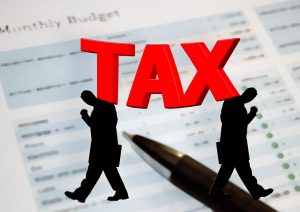Can you get rid of taxes through bankruptcy? As a bankruptcy law firm in Memphis, TN, this is one of the most common questions we hear every year around tax season.
The answer is often yes, but it depends on your situation. And there are three factors to consider:
 FACTOR #1: The age of your tax debt
FACTOR #1: The age of your tax debt
To get rid of the debt completely, first your tax debt needs to be at least three years old.
This can sometimes be complicated to figure out on your own, because the tax year is different from a normal year in that it starts on April 15th.
So to give an example, at the time of publishing this article in January 2020, we haven’t started the 2020 tax year yet. It doesn’t start until April 15th, so right now debts from 2015 and older can be discharged through a bankruptcy. After April 15th, 2016 tax debts will also be dischargeable.
In addition, if you asked for an extension, the three-year rule begins when you filed, which means it could delay the time you have to wait to discharge the debt in a bankruptcy.
For example, if you got permission to file late and then turned in everything on June 15th, 2016, you’ll be able to discharge the debt after June 15th, 2020 or later.
This rule and the math involved could confuse anyone. If you have any questions about how old your tax debts are, we’ll be happy to talk with you about it at no charge.
FACTOR #2: Whether you filed on time
The second factor to get rid of taxes through bankruptcy is you have to have filed on time.
Maybe you’re one of those people who never file by April 15th, but you always ask the IRS for an extension. This is perfectly all right if you have permission, as long as you filed by the extension deadline.
Bear in mind that if you asked for an extension, it will delay how soon you can discharge the debt in a bankruptcy, since it means the debt is even more recent.
FACTOR #3: The type of tax debt
To be completely dischargeable in a bankruptcy, the debt has to be for simple income tax.
Some people have other tax debt, like capital gains or property tax. If your tax debt is more complicated than a simple income tax, read on: there’s another option that might suit your situation better.
Our bankruptcy firm in Memphis, TN, can take a look at your tax debt for free. We’ll talk you through all three factors, and if you qualify, we’ll help you file a Chapter 7 bankruptcy that gets rid of the debt completely.
But What If I Don’t Qualify to Get Rid of Taxes Through Bankruptcy?
Maybe you already know your tax debt doesn’t qualify based on the three factors above. That doesn’t mean you’re out of options.
As opposed to Chapter 7 bankruptcy, a Chapter 13 bankruptcy allows you to include more recent tax debt by setting up a payment plan based on your specific situation.
And while the IRS sometimes also offers a payment plan option, Chapter 13 goes a step further: it allows you to include all of your other debts at the same time. So no matter how recent or complicated your tax debt, you can include it, along with your credit card debt, medical bills, and the like.
Getting Started with Discharging Your Tax Debt
The good news is, if you don’t know whether you qualify or which type of bankruptcy you might need, it costs nothing to find out.
At our Memphis bankruptcy firm, we rarely meet anyone who has a lot of tax debt but can’t use our services. There are multiple options depending on your situation, and any of them could change your life for the better.
I’ve met with clients who held on to tax debt for many years, along with all of the other debts that held them back. It affected their credit, their ability to save, and most importantly, their sense of freedom. I only wish they’d come to see me sooner, and so do they. Who wouldn’t want to enjoy their fresh start as soon as possible?
We can help you do exactly that. Contact us today for a free appointment.
